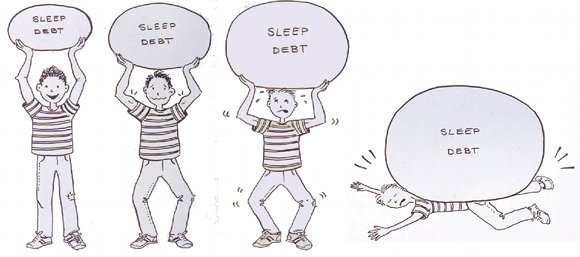Sleep Lesson: Learn the Impact of Sleep Debt on Performance
Sleep debt is the cumulative effect of not getting enough sleep. It is estimated that human beings need 7-9 hours to effectively function day to day. It is estimated that you will add one hour of sleep debt for every two hours you are awake. So, after you are awake for about 16 hours, you owe your body 8 hours of sleep.
As sleep debt rises during the day, your biological clock will alert you to stay awake until later in the evening. The effects of the alerting system are weakened midday (1-3 pm) which is why you often experience a period of decreased alertness after lunch time.
When you get less than a full night of sleep, your debt is not fully repaid and you carry it with you into the next day. You may feel fine after a night of limited sleep when engaged in a lot of activity or excitement during the day. However, when activity levels are reduced (i.e. a darkened lecture room, monotonous activity or sounds, or sitting as a passenger in a car), your sleep debt will be revealed when you begin to doze off or completely fall asleep (intentionally or otherwise). You might blame a boring lecture or the meal you ate, but the more likely explanation are the effects of accumulated sleep debt. Getting out of sleep debt is possible, but it’s not as simple as sleeping a couple extra hours on the weekends. It’s a function of how many days/hours of debt accumulated over a period of time and committing to getting as much rest as you need until your body is fully replenished. In general, you have to repay sleep debt hour for hour lost. If you have long term sleep debt, it may take a few weeks of committing to getting as much rest as you need until you have fully recovered.
Here’s an example. Your sleep requirement is 8 hours per night. Let’s say you sleep:
Monday- 6 hours (2 hours shy of sleep requirement)
Tuesday- 5 hours (3 hours shy of sleep requirement)
Wednesday- 4 hours (4 hours shy of sleep requirement)
Thursday- 7 hours (1 hours shy of sleep requirement)
Friday- 6 hours (2 hours shy of sleep requirement)
Weekly sleep debt total = 8 hours
Sleeping 12 hours on Saturday makes up 4 hours of the debt and repeating this sleeping pattern on Sunday repays the sleep debt from the week. By the end of Sunday, you have repaid 8 hours of debt!
This model assumes a clean slate of sleep debt without carrying over sleep debt from previous weeks.
But, if you have been functioning on less sleep for an extended period of time, it might take more like 2-3 weeks of sleeping as much as your body needs until the sleep debt is fully repaid. Check out this great website created by students who were inspired by their Sleep & Dreams class at Stanford (William Dement & the father of sleep medicine). It’s a great resource for students by students on sleep deprivation. http://www.end-your-sleep-deprivation.com/sleep-debt.html
Attaining optimal results in school and other performance activities (sports, music, etc.), requires a full night of restful sleep. Commitment to sleep should be consistent. That is, set a routine for waking up and going to bed at the same time each day that enables you to get 7-9 hours of sleep per night.
Can't see the form?
If the form is greyed out, be sure to sign into Google with your @ucsb.edu address and refresh!

This work is licensed under a Creative Commons Attribution 4.0 International License.
